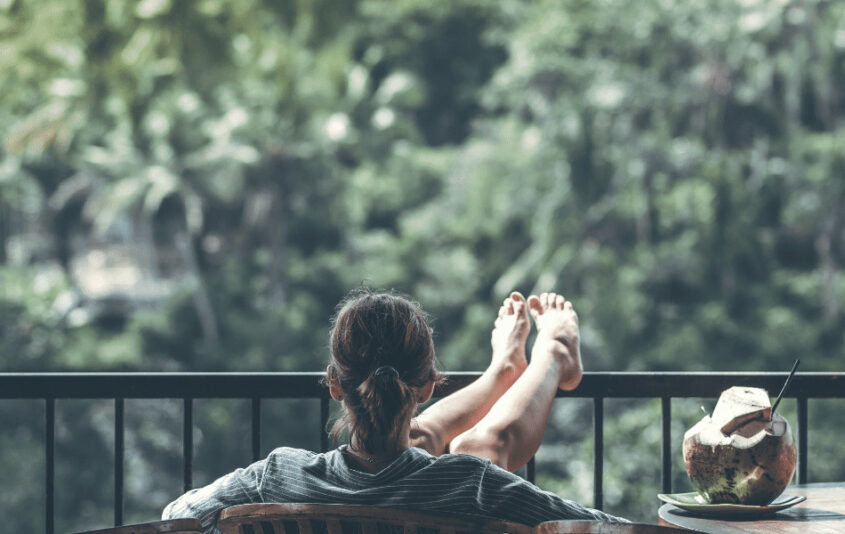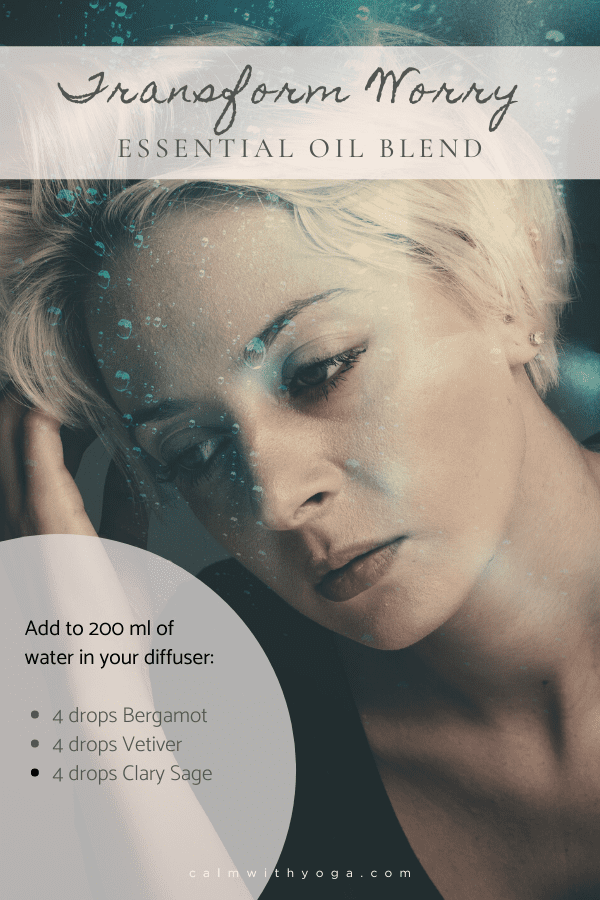Overview
With stress-related illnesses and anxiety disorders on the rise, mental health is more important now than ever.
Adopting daily empowering habits and natural stress relief strategies like breathwork, aromatherapy, meditation, and yoga can help you improve emotional well-being while increasing stress resilience.
Keep reading to learn how to use essential oils for more relaxation and inner calm.
Essential Oils As Natural Stress Relief Remedies
Essential oils are highly concentrated plant extracts that offer many health benefits when used safely and regularly.
They contain active chemicals known to calm the nervous system and regulate heart rate and blood pressure, which become elevated during stressful times.
Inhaling essential oils activates the brain’s limbic system, aka the emotional brain.
According to some studies, certain essential oils like vetiver oil have a sedative effect and can reduce the activity of the limbic system’s amygdala, which plays a role in regulating emotions like anxiety and fear.
Other oils like citrus scents (think sweet orange essential oil and bergamot oil), have an invigorating and energizing effect.
Oils like lavender and chamomile oil can help induce deeper sleep, which is vital for a balanced mood and lower anxiety levels.
The Most Relaxing Essential Oils For Your Toolkit
Lavender oil
- A series of clinical trials showed that ingesting 80 mg once a day of steam-distilled lavender oil resulted in reduced restlessness and agitation amongst 221 patients suffering from an anxiety disorder. They also noted improved sleep quality and an increase in general well-being and quality of life. (1)
- Another study comparing a 6-week oral daily dosage of 80 mg of lavender to lorazepam (an anxiety drug) found lavender to be just as effective at improving anxiety symptoms as 0.5 mg/daily of lorazepam in adults with GAD (generalized anxiety disorder). (2)
- Research also shows that inhaling lavender oil for just 5 minutes can significantly lower cortisol levels (stress hormone). (3)
Roman chamomile oil
- Roman chamomile essential oil can significantly relieve anxiety and worry in intensive care unit patients better than other conventional methods. It also showed improved sleep quality in those same patients. (4)
- A study published in the journal Alternative Therapies in Health and Medicine found Chamomile to have a ‘clinically meaningful antidepressant activity‘ and be an anxiolytic (anxiety-reliever). (5)
- A study on 80 volunteers found that this oil’s inhalation resulted in a calmer state, balanced mood, and increased ability to achieve deep sleep. (6)
Rose oil
- Rose essential oil can lower heart rate and blood pressure which indicates a decrease in nervous system stress response. (7)
- A 2017 clinical trial demonstrated that the inhalation of rose oil helped to decrease depression, anxiety, and stress in kidney dialysis patients. (8)
Ylang-ylang oil
- The topical application of ylang ylang essential oil has been shown to significantly decrease blood pressure and heart rate in healthy adults. (9) (10)
- Ylang ylang can also balance mood swings, relieve nervous tension and fearfulness, and help with low self-esteem. (11)
Bergamot oil
- Bergamot oil has been shown to relieve stress-induced anxiety mild mood disorders and may even offer neuroprotective qualities – protection of the brain and nervous system. (12)
- Inhalation of bergamot has been shown to activate your body’s relaxation response via the parasympathetic nervous system while also decreasing cortisol (stress hormone) levels. (13)
Vetiver oil
- In an animal study investigating the effects of vetiver oil on the amygdala (a part of the brain that overseas emotions and the fear response), researchers found that vetiver has similar effects to diazepam, an anxiety medication. (14)
Frankincense oil
- Research suggests that when inhaled the active ingredients in this oil can augment feelings of positive emotions and the sensation of warmth by influencing the brain and its emotional pathways. (15)
- The active ingredients in frankincense essential oil also make it a potent anti-inflammatory. (16) Since anxiety symptoms have been associated with inflammatory states within the body, Frankincense oil can help lower inflammation and therefore also anxiety. (17)
Jasmine oil
- One study found that Jasmine oil appears to have stimulating effects while also uplifting mood. (18)
- Another study published in the Journal of Health Research found that inhaling jasmine increased feelings of well-being and calms the nervous system without sedative side effects. (19)
Clary sage oil
- A study investigating the effects of clary sage of the autonomic nervous system found that it can decrease blood pressure and breathing rate while inducing the relaxation response. (20)
- Clary sage essential oil may also help to significantly lower anxiety levels in a mother’s active labor process. (21)
Other potential relaxing oils might be:
- Lemongrass essential oil
- Peppermint oil
- Sandalwood
- Geranium
- Neroli
Safety Concerns
- Essential oils are potent. A little goes a long way, and you only need a few drops to reap the benefits.
- If you use them carefully and mindfully, there’s a low chance of adverse side effects. (If you have a known allergy to a specific plant or oil, avoid using it.)
- If you experience any adverse reaction to any essential oil, then discontinue use immediately.
- Be aware of the contraindications for each oil you use as some of them aren’t safe for babies, young children, pregnant women, or those with high blood pressure or epilepsy.
- EOs are not regulated by the Food and Drug Administration (FDA), so it’s important only to choose the highest quality products. Always choose certified organic, therapeutic grade oils that are 100% unadulterated.
- Perform a patch test on a small area of your skin and wait 24-48 hours. Proceed with the oil if you do not react.
How To Use Aromatherapy Oils For Relaxation
Topically:
Dilute your essential oils in a carrier oil like coconut oil or jojoba oil.
Dilute 2-3 drops of EO per 1 teaspoon of carrier oil for adults.
This will protect your skin from possible irritation while ensuring that the oils get absorbed into the skin for maximum therapeutic effect.
You can massage the mixture on your temples, forehead, outer ear area, neck, and shoulders.
Inhaler:
Another direct method is to add 30-40 drops of essential oils to the cotton wick of a non-plastic inhaler.
Take deep breaths as you inhale the aromas.
Pairing aromatherapy with a breathing practice is an excellent way to increase relaxation.
Diffuser:
A less concentrated method is to use a diffuser that will disperse the oils’ active compounds into the air.
Add 12-15 drops of essential oil per 200 ml of water.
A DIY Essential Oil Blend For Stressful Days
Transform Worry Diffuser Blend
Symptoms:
Worry, unease, dread, ruminating, sense of foreboding, expecting the worst.
Diffuse this blend and take a few deep, slow, deliberate belly breaths.
By working your breathing with the aromatic oil you increase your chances of relaxing.
Essential oils are most effective when you use them regularly.
Make them a part of your everyday life and notice the difference.
REFERENCES
:
(1) https://www.ncbi.nlm.nih.gov/pubmed/20512042/
(2) https://www.ncbi.nlm.nih.gov/pubmed/19962288/
(3) https://www.ncbi.nlm.nih.gov/pubmed/17291597
(4) https://www.ncbi.nlm.nih.gov/pmc/articles/PMC3588400/
(5) https://www.ncbi.nlm.nih.gov/pmc/articles/PMC3600408/
(6) https://www.researchgate.net/publication/229226111_Expectancy_and_the_aroma_of_Chamomile_influence_mood_and_cognition_in_healthy_volunteers
(7) https://journals.sagepub.com/doi/pdf/10.1177/1934578X0900400226
(8) https://www.researchgate.net/publication/319923477_Effects_of_Aromatherapy_Using_the_Damask_Rose_Essential_Oil_on_Depression_Anxiety_and_Stress_in_Hemodialysis_Patients_A_Clinical_Trial
(9) https://www.ncbi.nlm.nih.gov/pubmed/16807875
(10) https://www.researchgate.net/publication/258925284_Effects_of_Ylang-Ylang_aroma_on_blood_pressure_and_heart_rate_in_healthy_men
(11) Holmes, Aromatica, 364
(12) https://www.sciencedirect.com/science/article/abs/pii/S0367326X10000171
(13) https://www.ncbi.nlm.nih.gov/pubmed/25824404
(14) https://www.ncbi.nlm.nih.gov/pubmed/25553641
(15) https://www.ncbi.nlm.nih.gov/pmc/articles/PMC2493463/
(16) https://www.ncbi.nlm.nih.gov/pubmed/17895408
(17) https://www.ncbi.nlm.nih.gov/pubmed/22814704
(18) https://www.ncbi.nlm.nih.gov/pubmed/20184043
(19) https://www.researchgate.net/publication/236235613_The_effects_of_jasmine_Oil_inhalation_on_brain_wave_activies_and_emotions
(20) https://www.ncbi.nlm.nih.gov/pmc/articles/PMC3700459/
(21) https://www.ncbi.nlm.nih.gov/pubmed/17506789/













